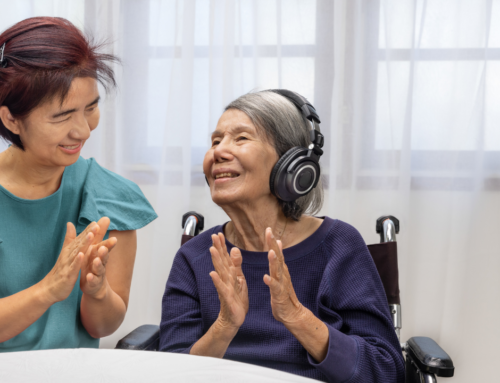Share This Story!
Trouble At Sundown?
Caring for someone with dementia can be challenging, especially in the evening. One common symptom of dementia is sundowning, a behavioral change that happens late in the afternoon and may continue into the night. Loved ones will notice signs of confusion, restlessness, irritability, anxiety, and demanding behaviors. In severe cases, some yell, pace, have mood swings and hear or see things that are not there.
What causes sundowning?
One in 5 people with Alzheimer’s may experience sundowning. However, an older person who does not have dementia can experience the phenomenon. Medical experts have not been able to find the exact cause of sundowning, but there are some triggers. Some include disrupted body clocks, fading light, hunger or thirst, depression, pain, and increased shadows. As research continues, experts will be able to uncover this uncanny relationship.
Here’s how you can help
Although the situation may be frustrating at first, there are ways to help loved ones manage sundowning episodes. The key is to identify the triggers, then limit and help avoid those triggers. Some other key steps can help seniors feel safe and comfortable in the evening.
Have a daily routine
Set regular times to wake up, eat meals, and sleep, and make sure everyone sticks to the routine. Make sure to incorporate physical exercise in the day, which can improve sleep and decrease insomnia. Finally, schedule doctor’s visits and other appointments early in the day to avoid breaking the routine.
Avoid things that may affect sleep
Avoid sugar and caffeine as much as possible. Both could raise cortisol levels and reduce sleep quality. Focus on a healthy diet and drinks, especially late, keeping evening meals small and simple. Studies show that overeating can impact sleep patterns. Remind the loved one to avoid long naps that go into the evening, reducing sleep and increasing confusion.
Keep the evenings calm
As the day winds down, make sure to set a comfortable mood. First, keep the lights on to lessen the shadows and darkness. Next, adjust the temperature to help with comfort. Relaxing music, games, or reading can help everyone wind down. Everyone in the home must contribute by reducing noise, using devices in another room, and setting a similar sleep schedule.
Practice self-care for sundowning
If these tips don’t seem to work, consult with the senior’s doctor. The doctor may be able to suggest drugs to improve sleep quality. Caring for a loved one who’s sundowning or who has dementia is undoubtedly exhausting. The family should practice self-care too. Families can only provide the necessary support if all are well-rested and in good health. If managing the condition is stressful, consider hiring professional help.





